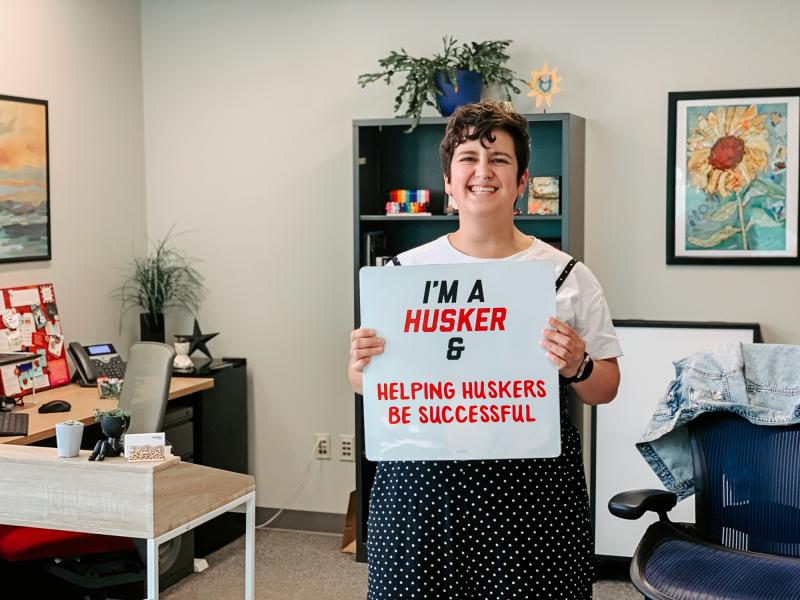Maya
Visitor Services Manager · Dallas, Texas
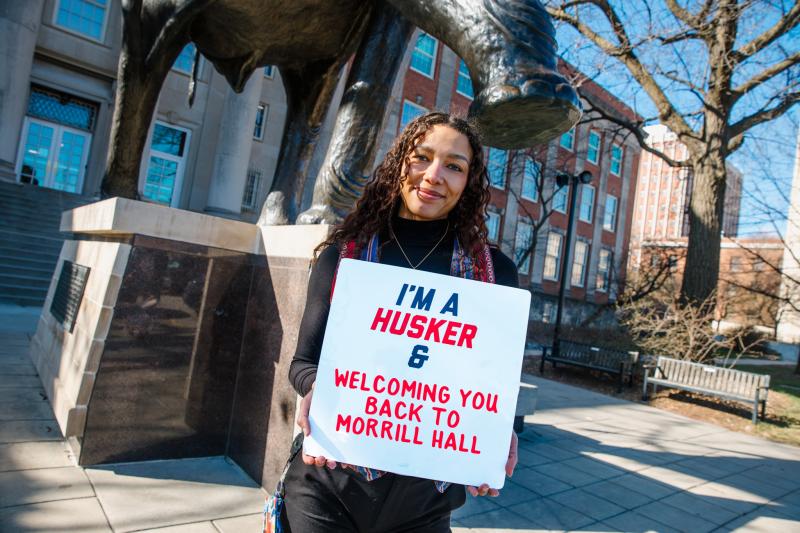
At 97 years old, Morrill Hall was ready for a touch-up. And, after months of renovations to improve the visitor experience and enhance exhibitions, the campus staple is back open to Nebraskans of all ages who are eager to learn and discover.
Maya, Visitor Services Manager for the museum, is ready to greet you at the door and tell you all about it.
“We really just wanted to give the building a new look and reinvigorate people’s excitement to come to Morrill Hall,” says Maya. “It’s the same shell, but there are lots of cosmetic changes and improvements to accessibility.
“Plus,” she adds, “we have two new exhibits opening!”
Called "Artists of Nebraska,” the new exhibits each spotlight Nebraska artists (and former Huskers) whose work magnifies the beauty of the natural world: muralist Elizabeth Dolan and photographer Joel Sartore.
“A big focal point in the museum has always been Elizabeth Dolan’s murals that you see on the first and second floors,” Maya explains of the murals Dolan painted in the 1920s. “She barely got paid and received little attention at the time, so it's great to have this new exhibit that gives her that credit.”
Of the exhibit containing works by Sartore, Maya says this is an exciting Morrill Hall exclusive.
“Joel Sartore is a National Geographic photographer from Lincoln who’s done dozens of projects on endangered species. We’re super excited because this will be the first and only permanent exhibit of his work in the country.”
For her part, Maya was always interested in STEM but as a student felt a calling toward UNL’s hospitality, restaurant and tourism management program, from which she graduated in 2021. In her role at Morrill Hall, she hopes to use her hospitality skillset and creative instincts in ways big and small to instill a love for STEM in others.
“Even when I’m stocking the gift shop, my hope is that it helps expand the learning experience,” says Maya. “If a little kid sees something interesting and takes it home, maybe it’ll inspire a love for science and STEM.”
“Even when I’m stocking the gift shop, my hope is that it helps expand the learning experience. If a little kid sees something interesting and takes it home, maybe it’ll inspire a love for science and STEM.”
Craig
· Emporia, Kansas
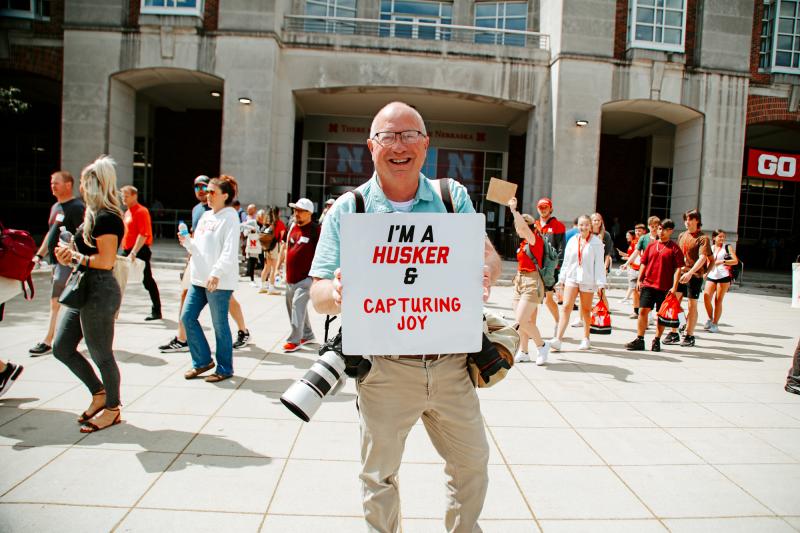
If you know Craig, you love him. And even if you don’t know Craig, you definitely know — and love —Craig’s work.
As Director of Photography for UNL, Craig’s eye for emotion and knack for being in the right place has created some of our university's most indelible imagery. Craig’s lens has seen it all, from capturing groundbreaking research, community impacts and celebrations to charting the changing seasons on campus — even the occasional foray into nature photography with campus squirrels.
With 15 years at UNL, Craig’s still excited about the next shoot.
“I tell people that behind every door there’s something amazing. And I still haven’t opened every door here,” says Craig. “The energy here is incredible.”
Equally as incredible is the creative flare that marks his work.
“I’ve been here long enough where people know me and are happy to go along with my crazy ideas,” he laughs, citing his wall of 240+ portraits of @engler_unl students on East Campus as an example. “I love working with the students to capture the essence of what they’re doing.”
Craig joined UNL in 2007 after a career in photojournalism that included time at the Omaha World Herald. There, Craig led projects documenting unique sights in all 93 Nebraska counties and all remaining one-room schoolhouses, nurturing a love for the state that shines in his work as a Husker.
"For me, what makes a good photo is the emotion,” Craig shares. “If people like a photo I’ve taken, I know that they’ve felt a connection to this place through my photos — I just love that.”
The 68 (and counting) graduation ceremonies that he’s photographed have made for some of his favorite, and most emotional, images.
“It’s the joy factor, for me. Everyone is just so happy.”
And though the summer months bring an emptier campus with fewer students to photograph, it also means that Craig’s favorite time of year for taking pictures is around the corner.
“My absolute favorite is the week before fall classes begin. The events, the tunnel walk, the BBQs, the sounds — this place just comes alive.”
“ tell people that behind every door there’s something amazing. And I still haven’t opened every door here”
Joe
Academic Success Coach · Manila, Philippines
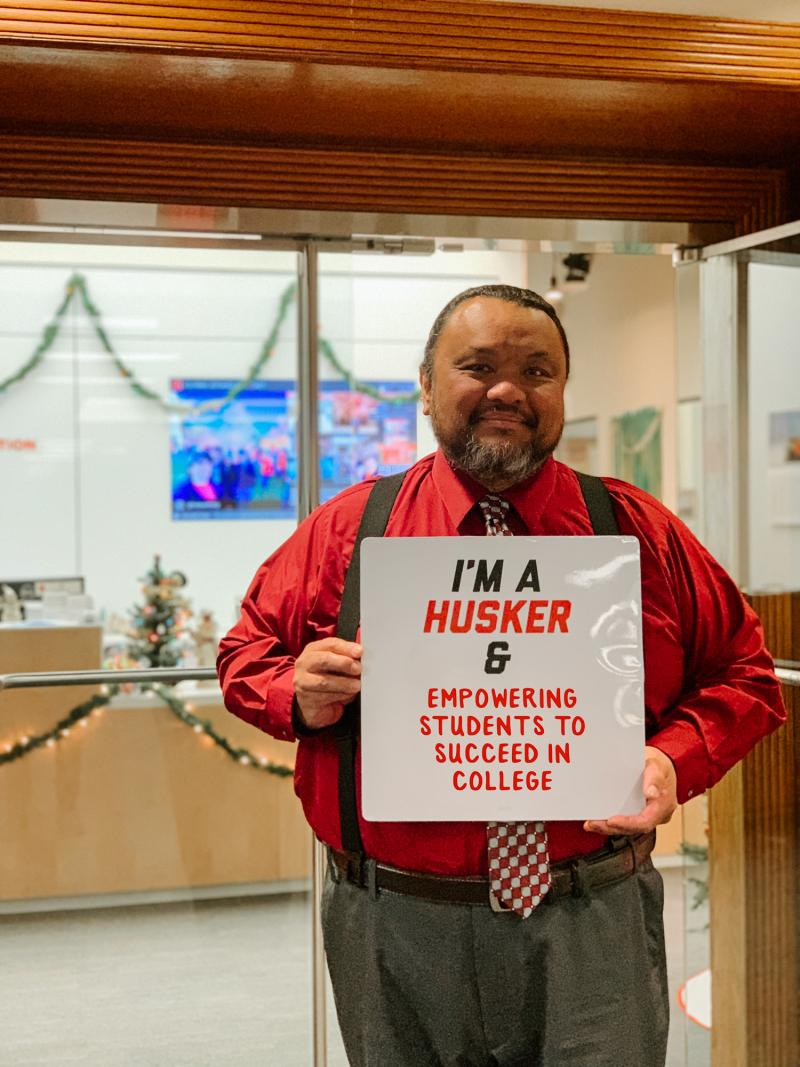
When you sit down for a meeting with Joe, it’s likely you'll talk about food or comic books before you get to anything related to school. His office in the Center for Academic Success and Transition is covered with comic book posters and photos of Filipino cuisine – not to mention the buffet of Asian candies on his desk.
Joe uses his own culture and interests to connect with students and get them talking about themselves. It’s also, he says, to encourage them to value their own backgrounds.
"I use the posters of Filipino cuisine in my office to ask students, ‘What’s on your plate? What’s home-cooked food for you?’ It’s a way for me to engage students to feel welcomed and know that their background, community and memories of home are important.”
As an Academic Success Coach, Joe helps Huskers settle into life at UNL and talk through some of the challenges being a student brings about. He gives emphasis to students who, like himself, are first-generation and come from diverse backgrounds.
“First-generation students are trailblazers in their family and might not have the same support as others. As a coach, I’m here to help those first-year Huskers who maybe haven’t had a family member go to college. I show them what’s possible in our community and give them strategies and tools to be successful.”
Joe, who was born in the Philippines and raised in Southern California, stresses that being a Husker can look a lot of different ways.
“Being a Husker is more than wearing red; everyone brings in a rich background and culture and adds it to the experience,” he explains. “It’s not about trying to become like everyone else; it’s about what’s unique to you that you bring to UNL.”
Joe likes to use himself as an example to show everyone has a unique path – and that’s okay. He took a 15-year break from college before going back to earn his bachelor’s and master's degrees.
“When students say they’re afraid of failing, I always tell them to take it from me: the struggle isn’t the end. There’s always a way to make it through.”
“When students say they’re afraid of failing, I always tell them to take it from me: the struggle isn’t the end. There’s always a way to make it through.”
Kenji
Assistant Director of Big Red Resilience & Well-Being · Phoneix, Arizona
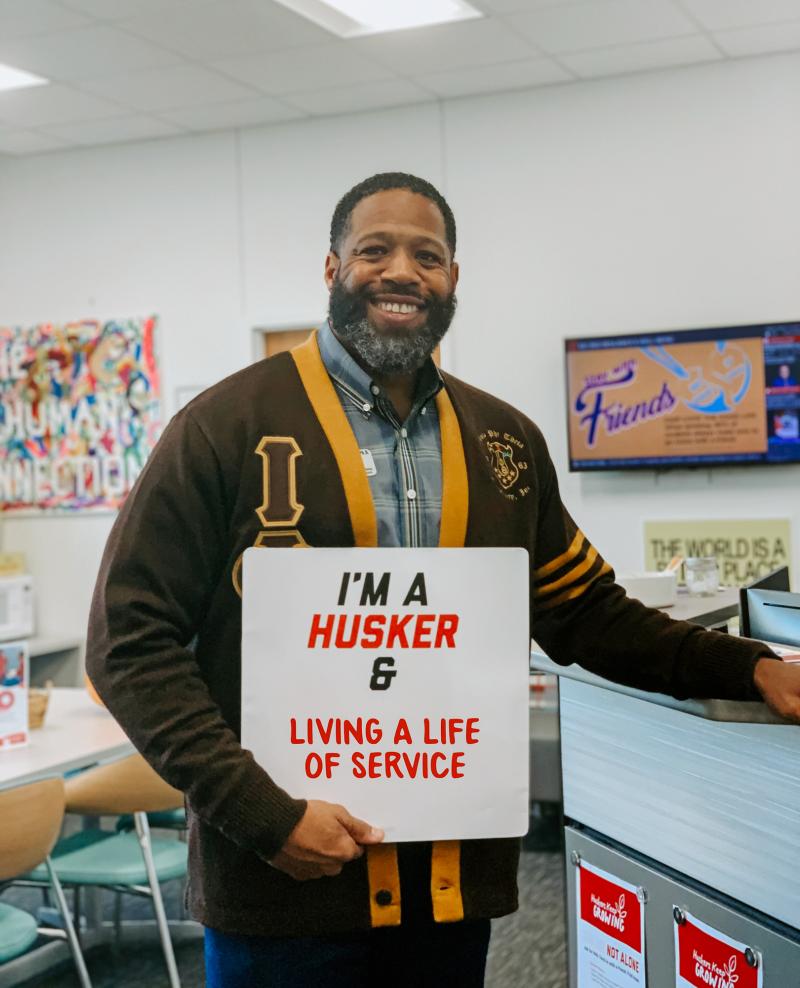
Upon reflection, Kenji can trace a throughline of service from his time in the military all the way to his current role as associate director of Big Red Resilience & Well-Being (BRRWB). This dedication to service began when he enlisted in the United States Army after graduating from UNL in 1999, and now manifests in making sure all Husker students feel seen, supported and protected on campus through BRRWB.
"Where I’m at now, I see that all the discipline, experience, and relationships that I’ve built through my years of service have taught me to consider everyone equally,” Kenji says. “When you need help and resources, it doesn’t matter if you have different experiences, different backgrounds or different belief systems. What matters is the feeling that someone has your well-being in their hands.”
Kenji, who grew up in Phoenix, came to UNL in 1995 and graduated with a degree in psychology. Because his father was a career Marine, service was always in the back of his mind.
“I’ve always intrinsically known that I wanted to serve in some capacity. This is the social scientist in me, but I feel it was a way for my father and I to connect through a transcendental calling, through something greater.”
Kenji recalls he and his father comparing their basic training photos, reflecting on who they were then and the men they grew to become in the military.
“Looking at these pictures, I see these wide-eyed young men not really having any idea what the bigger world is all about. Putting on the uniform gave me a better understanding of myself, my responsibility to others, the larger world and different perspectives.”
On Veterans Day, Kenji says that it’s not just a time to memorialize—we must also consider.
“Veterans Day to me is an opportunity to consider. I consider not only my service, but the service of those who I’ll never meet, their families, their sacrifice and their service to the greater good. It’s a responsibility we have, as civilians, to consider those that selflessly give themselves to protect our freedoms.”
“Putting on the uniform gave me a better understanding of myself, my responsibility to others, the larger world and different perspectives.”
Mikki
Assistant Director of Professional & Life Skills ·
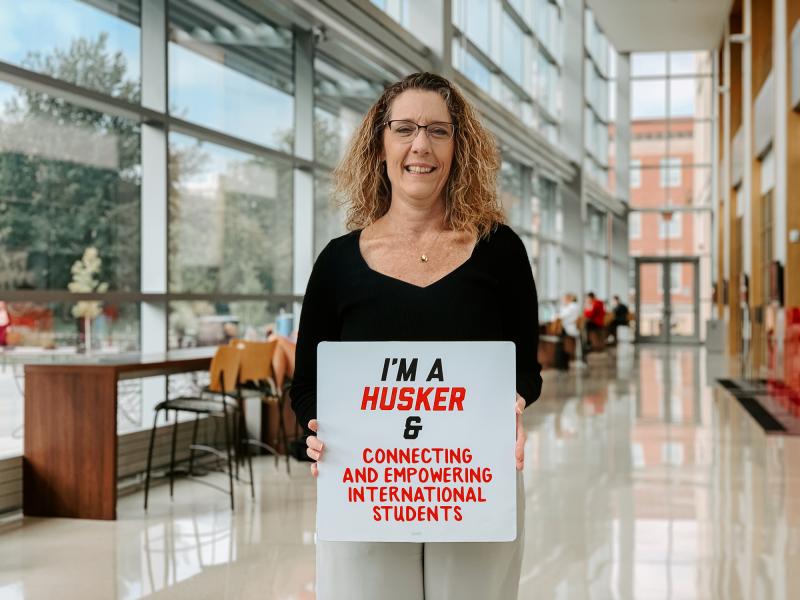
As a mother who can’t help but put herself in others’ shoes, Mikki is a passionate—and impactful—advisor, mentor and friend to international students at UNL.
“Thinking about sending my own kids to another country for four years—to study, live and engage with another culture and language without having family nearby—I put myself in the shoes of the students and their parents and think, ’How in the world could you navigate all this?’”
This empathy has led Mikki to be an advisor to the Rwandan Student Association and Business International Student Association, affirming and addressing the issues they face while also helping them make connections around campus and in the community.
“I really want to be there to support international students and am honored when they talk to me about their experiences,” says Mikki.
Going further, Mikki developed a seminar in the College of Business for international students that offers language support, one-on-one tutoring, academic guidance and networking opportunities.
“Language barriers can affect many things in your day-to-day life: your education, your ability to interact in the classroom, comprehend the material, and study,” Mikki explains. “It’s very layered.”
They also result in another common challenge for international students: connecting with their American classmates.
“A lot of students have high hopes about making American friends; many people are very friendly here, but it can be hard to cross those cultural divides and really find things in common.”
Mikki challenges domestic students to be more intentional about including international students across campus.
“As students come into your classes and dorms, make the effort to sit and listen to them, ask questions, and be curious—it makes a huge difference,” she says.
“It takes work to develop a friendship no matter where you’re from. My role is advocating for international students to have the strength and courage to keep trying.”
“It takes work to develop a friendship no matter where you’re from. My role is advocating for international students to have the strength and courage to keep trying.”
Wahadi
Executive Chef · Biloxi, Mississippi
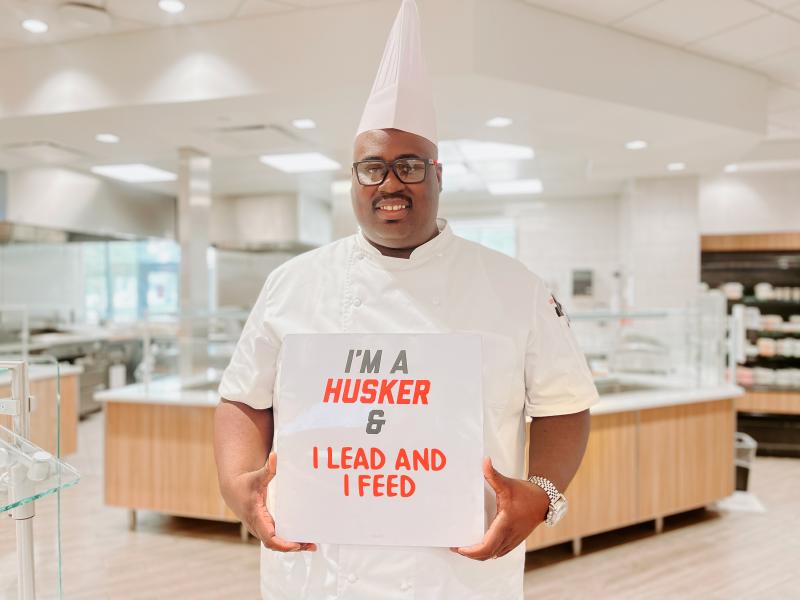
Life hasn’t always been easy for Wahadi. Over the years, he's faced many challenges, from having his home destroyed by Hurricane Katrina to living in a car while juggling multiple jobs. But for Wahadi, there was always one thing that meant happy moments, inspiration and opportunity: food.
Growing up in the Deep South, Wahadi wasn’t interested in the same things as other kids. While they were playing outside, he was watching his grandfather cook. Though his family couldn’t afford to travel, immersing himself in different cuisines was his way of learning about other cultures and their history. He found the most happiness when sharing a meal with loved ones—times where conversation always flowed and smiles were on everyone's faces. And it was these moments that inspired him to enroll in culinary school and pursue a career in connecting with others through food.
After spending years in the industry, Wahadi now serves as the executive chef for Nebraska. He believes in using the power of food to celebrate communities and build relationships with Huskers and is working to create a heightened dining experience that satisfies thousands of Huskers and reflects cultures across the university.
“Students are hungry to experience and put their stamp on the world. My job is to help facilitate that and I come to work every day with that attitude. It’s hard for that to not become global thinking—we can be inclusive with food, it’s one of the easiest ways!”
Wahadi has a clear vision for Dining Services: revamping the catering program, creating seasonal, culturally-diverse and flavorful menus and helping his staff maintain a healthy work-life balance. He hopes everyone feels excited and celebrated when they walk into one of the university’s dining halls, whether it’s for a meal or to work a dinner shift.
“There’s a group of people here that’s dedicated to leveling up. We’re pushing very hard and are invested in providing a higher level of service. Everyone at the university is here because they have a dream. We’re here to feed that dream.”
“Everyone at the university is here because they have a dream. We’re here to feed that dream.”
Jolene
Landscape Services Area Leader · Lincoln, Nebraska
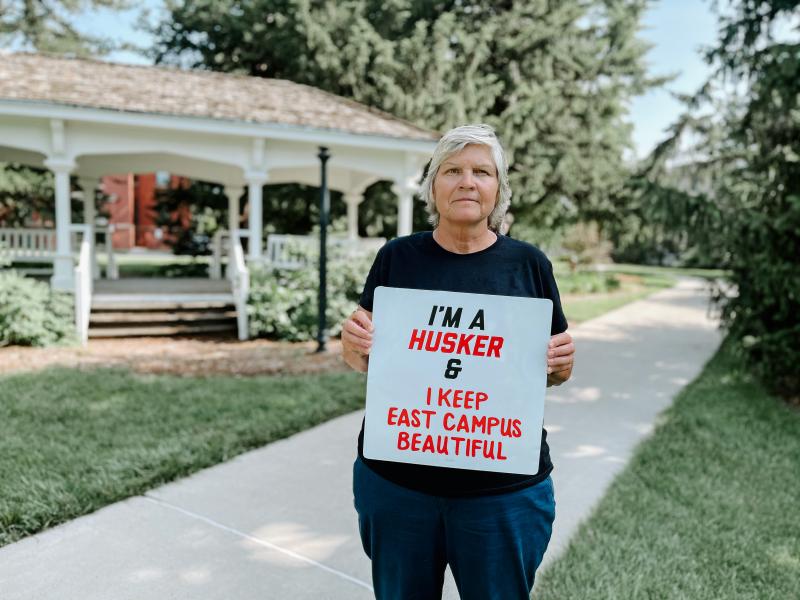
Even if you don’t know Jolene by name, you’re probably a fan of her work.
Thanks to the tireless efforts of Jolene and her colleagues at the university’s Landscape Services, we get beautiful campus views—and another reason to say there is no place like Nebraska.
Jolene—who has worked with the department for 16 years—is responsible for making sure East Campus is a safe, inviting and well-maintained place for Huskers and the Nebraska community to enjoy.
"At this stage in my life, I have a real passion for the job. My brain seems to be wired for the problem solving, planning, and details required to do this job well."
Jolene’s passion for her job spans from the simple pleasures of planting grass to planning for the busy spring season which has her team planting hundreds of flowers.
But Jolene’s team doesn’t just work on pruning and planting in the warmer months. Landscape Services works year-round to keep campus up to par—even braving cold Nebraska winters to clear snow off 15 miles of streets, 37 miles of sidewalks and 90 acres of parking lots, often while the rest of campus is asleep.
“I am proud of the work we do. At Landscape Services, we are many things. We are experts in chemical application and equipment operation; we are entomologists, horticulturists, arborists and environmentalists."
No matter what her role has her doing, Jolene takes pride in excelling in the male-dominated industry as one of three women in charge of landscaping on campus; and pride in her department as a whole: a small group that does big things.
“At Landscape Services, we are many things. We are experts in chemical application and equipment operation; we are entomologists, horticulturists, arborists and environmentalists.”
GAIL
Associate Registrar · Lincoln, Nebraska
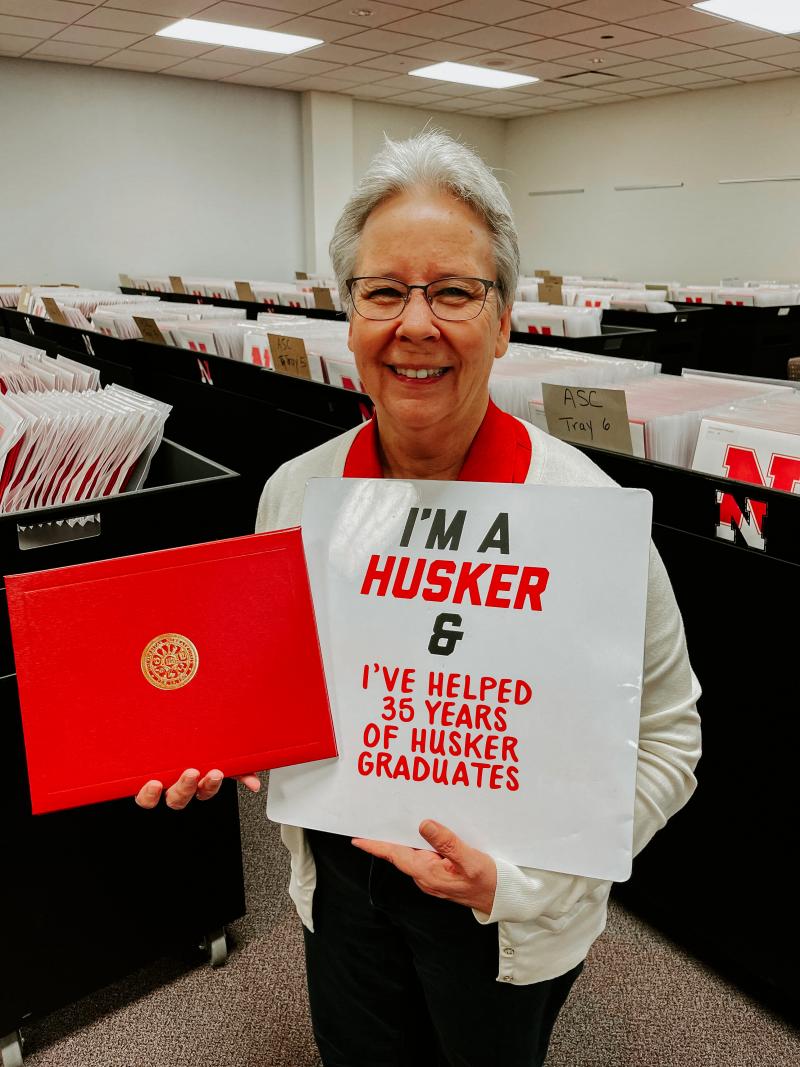
Nebraska is one of the few universities in the country to distribute actual diplomas to students as they cross the stage at commencement. And, if you’ve graduated from the University of Nebraska–Lincoln in the past 35 years, it’s Gail and her team members that made sure you received your diploma!
Gail joined the university 38 years ago working with international student admissions. Three years later she moved to the registrar’s office and began supporting students in a different way: making sure their experience graduating from Nebraska is as seamless as possible. Gail fell in love with the position and has been working with graduating students since.
"Any of my staff members would say there is tremendous satisfaction in having some part in seeing a student finish their academic career here and graduate. It’s very satisfying to have had some part in that happening.”
To clear students to graduate and prepare for the commencement ceremony, there are several moving parts for Gail and her team to complete. It begins months ahead of graduation with reviewing current grades and communicating with students who are at risk of not passing any required coursework—a key part in ensuring Huskers are able to receive their diplomas at commencement.
Then comes preparation for the commencement ceremony itself. After printing the diplomas and inserting them into their covers, Gail and her team triple-proof them for spellings, distinctions and other important details. Next is the meticulous process of making sure each diploma is in correspondence with the student who will receive it and the seat they’ll sit in during the ceremony—and mailing diplomas for students who don’t attend the ceremony.
After over 35 years, Gail continues to find great enjoyment in being a part of the unique experience that is Husker graduation. She is excited to keep supporting soon-to-be graduates and as Nebraska awards record numbers of degrees, it’s her goal to continue adapting to ensure the commencement ceremony is a celebration that will stay in Huskers’ memories for decades to come!
“Any of my staff members would say there is tremendous satisfaction in having some part in seeing a student finish their academic career here and graduate. It’s very satisfying to have had some part in that happening!”
Quinna
Assistant Director of Fraternity and Sorority Life · Nashville, Tennessee
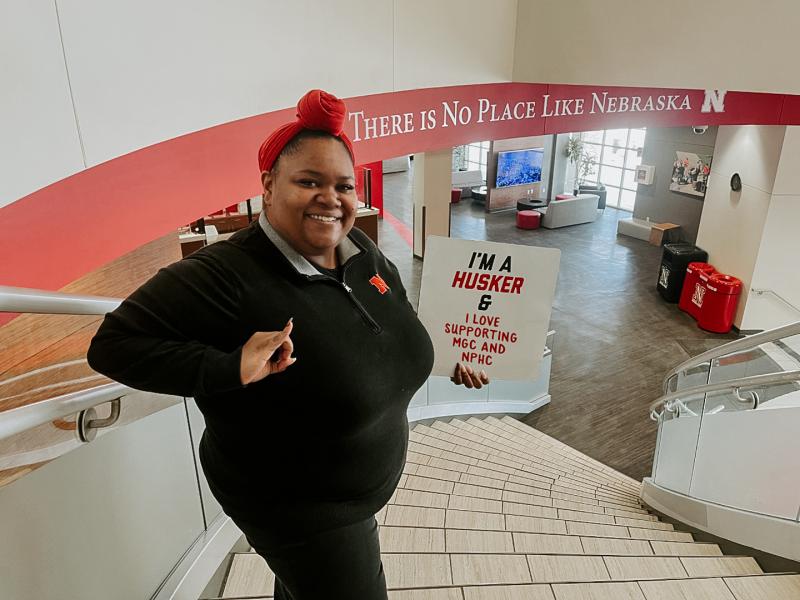
As one of the assistant directors of fraternity and sorority life at Nebraska, Quinna Hogan oversees National Pan-Hellenic Council (NPHC) and the Multicultural Greek Council (MGC). Her ties to Greek life stretch back to the hallways of her middle school, where she remembers seeing one of her teachers proudly display the pink and green hues of Alpha Kappa Alpha — the sorority she would one day join.
With her experiences in Greek life as an undergraduate under her belt, Quinna now hopes to help students at Nebraska succeed in their own chapters.
Nebraska U’s National Pan-Hellenic Council Greek chapters date back as far as 1916, when Kappa Alpha Psi first formed an on-campus presence with their Eta chapter. Four years later, the Omicron chapter of Delta Sigma Theta started on campus. In Greek organizations, chapters take on a letter of the Greek alphabet signifying their spot in the national organization lineage. This would make Nebraska’s Kappa Alpha Psi the eighth chapter within the United States, and Delta Sigma Theta the 15th.
“When I first came to the university, I was elated that a PWI (predominantly white institution) of UNL’s magnitude had single-letter organizations,” Quinna said. “Back where I’m from, I’m from the South, when you hear a single-letter organization, it means something. It’s a pretty big deal… And so to think UNL has two single-letter organizations on this campus — that is a phenomenal thing to have. But I don’t know that the culture is celebrated that way.”
Quinna is devoted to helping current National Pan-Hellenic Council students realize the magnitude and momentum of their organizations. She wants them to be known for their knowledge, leadership and stewardship. When she walks across campus, she hopes to see them going to and from classes while wearing their letters with pride. She wants them to be recognized.
“The time is now,” Quinna said. “I think specifically… NPHC has been at UNL way, way too long for them not to have the recognition that they deserve.”
“When I first came to the university, I was elated that a PWI (predominantly white institution) of UNL’s magnitude had single-letter organizations.”
Heather Mahowald
Recruiting officer and instructor for Air Force ROTC · East Grand Forks, Minnesota
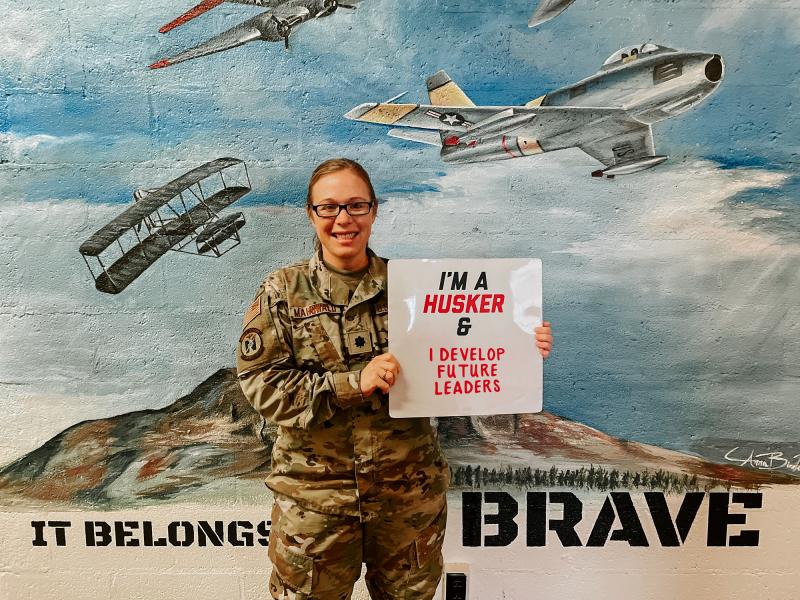
Heather knew she wanted to serve her country from a young age. Growing up, she often listened to the stories her dad told her about life in the Army. In 2000, she joined the Air Force ROTC. Now, 18 years later, Heather is a cadre member at the University of Nebraska–Lincoln’s Air Force ROTC program.
Heather completed her degree and then commissioned into the military as a force support officer. After eight years of active duty, Heather switched to the reserves and started her family. As her kids grew out of their toddler years, she decided it was time to return to active duty.
“I really missed leading, I really missed that ability to be a positive influence,” Heather said. “So when I saw the opportunity to teach ROTC and come back on active duty, I jumped at the chance to do it.”
Heather's job allows her to work directly with the Air Force’s future leaders, whether it’s through teaching classes or talking with them one-on-one about their future in the Air and Space Force.
“I also really have a strong desire to be a positive influence on the next generation...it energizes me to be a part of that mission,” Heather said.
But being a member of the military isn’t always easy.
“We have a lot of sacrifices that we have to make for our families because the mission comes first,” Heather said.
That means she can be away from her family for months for training or have to leave for work early and come home late. She misses time with her kids, but she knows it’s worth it.
“On Veteran’s Day my kids write stories to their favorite vet, and they will usually write a story about their mom,” Heather said. “Their little stories reflect on how I’ve had to be gone from home but also how proud they are of what their mom gets to do. When I get to see the stories they bring home, I know that they get it. They know that what mom is doing is important.”
“I also really have a strong desire to be a positive influence on the next generation...it energizes me to be a part of that mission.”
Karen Kassebaum
Assistant Vice Chancellor for Inclusive Leadership & Learning ·
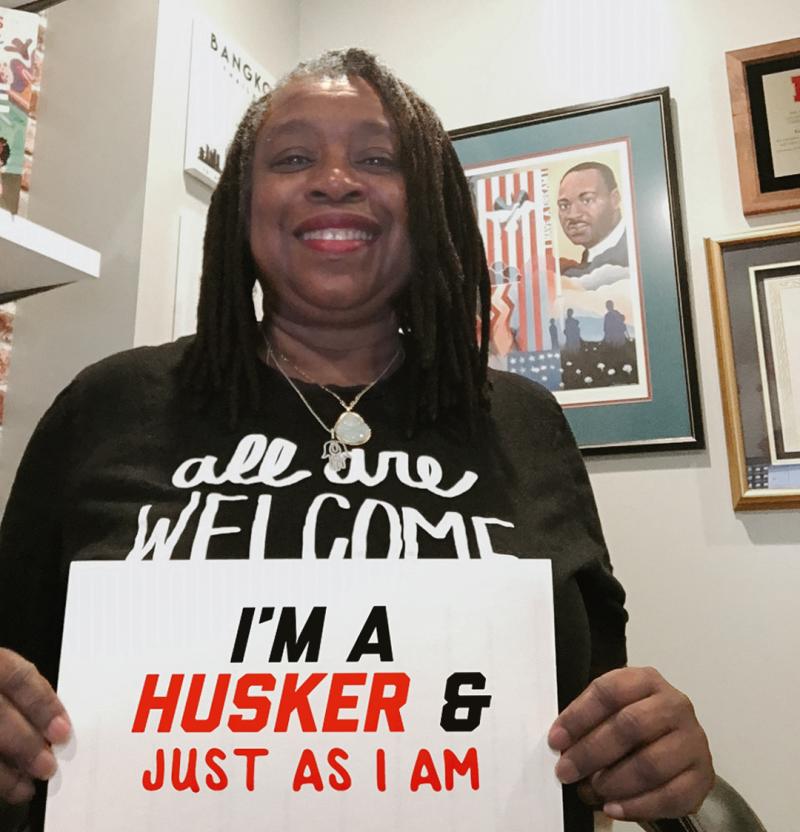
Karen cares about inclusive excellence — so much so that she is spearheading #NCLUDE, a University of Nebraska–Lincoln program that brings together Huskers from across the world to share their inclusivity practices.
NCLUDE stands for "Nebraska Community of Learners — Understanding Diversity through Education." Any Husker — from on-campus students, to out-of-country alumni, to Nebraska community members — can be a part of NCLUDE. By bringing together a variety of voices to discuss diversity, Karen hopes to be able to inspire conversations that break barriers. NCLUDE participants can network with new faces from places, industry spaces and lifestyles unlike their own as they work toward finding new ways to promote inclusivity.
At NCLUDE events, everyone is invited to share their thoughts. While Karen says many come to the online Zoom sessions to listen, she wants participants to know that all voices are important in these conversations.
"When you think about moving forward in relation to injustice and racism and hate and all those things…we can't depend on other people to do the work,” Karen said. “You have to do the work...as individuals."
Karen describes "the work" as a lifestyle change. It's not just one book or one workshop — it's a complete review of one's value system and an authentic conversation over areas of that system that incorporate bias and discrimination. From there, people can take action.
"And if we share those things then it gives us things to do and we can do it better, because people have been lately — especially with the unrest and the discrimination and racism and hate and murders — people are ready to do some stuff," Karen said. "And I think the thing that we can do right away is practice inclusive excellence."
“When you think about moving forward in relation to injustice and racism and hate and all those things…we can't depend on other people to do the work. You have to do the work...as individuals.”
Don
custodial services · LIncoln, Nebraska
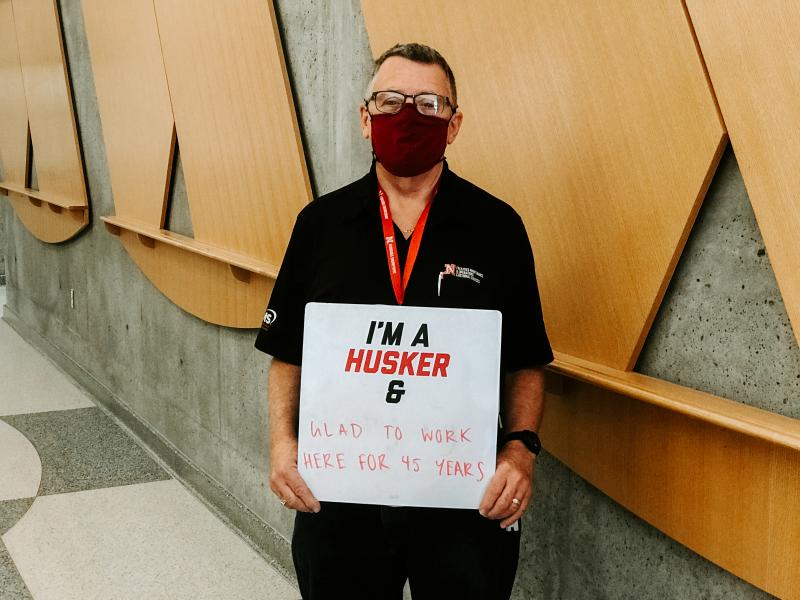
Today and every day, we’re thankful for our Husker community that is full of giving, dedicated people whose Husker pride runs deep. Don is one of those people. Over the past 45 years, he has gotten to know campus pretty well. As a member of the custodial services staff, he's kept City and East Campus spaces clean since he started working for the department in April 1975. But before Don worked at the University of Nebraska–Lincoln, his father and mother were also staff members with custodial services. For a little while, the trio even worked alongside each other. And it doesn't stop there — Don's wife also worked for UNL for a number of years. According to Don's calculations, the family has worked more than 80 years for the university. The years add up even more when Don accounts for his more distant family members, like his uncle who worked in maintenance at the Nebraska Union post-World War II. Don's familial ties to the university are just as strong as the ties he's made with the campus community. Over the years he's been stationed in different halls, allowing him to make connections with faculty, staff and students as they cross paths during their daily routines. His time at the university has even afforded him some once-in-a-lifetime opportunities, like working on the set of "Terms of Endearment" when it was filmed on campus in the 1980s. Don has enjoyed the past 45 years, and he doesn't plan to retire anytime soon. "I hope to be here another at least four and a half to make it to 50," Don said, "And dependent on financial situations and health situations, I just might make it to 55 years."
“I hope to be here another at least four and a half to make it to 50. And dependent on financial situations and health situations, I just might make it to 55 years.”
Neo
Licensed Therapy Dog · LIncoln, Nebraska
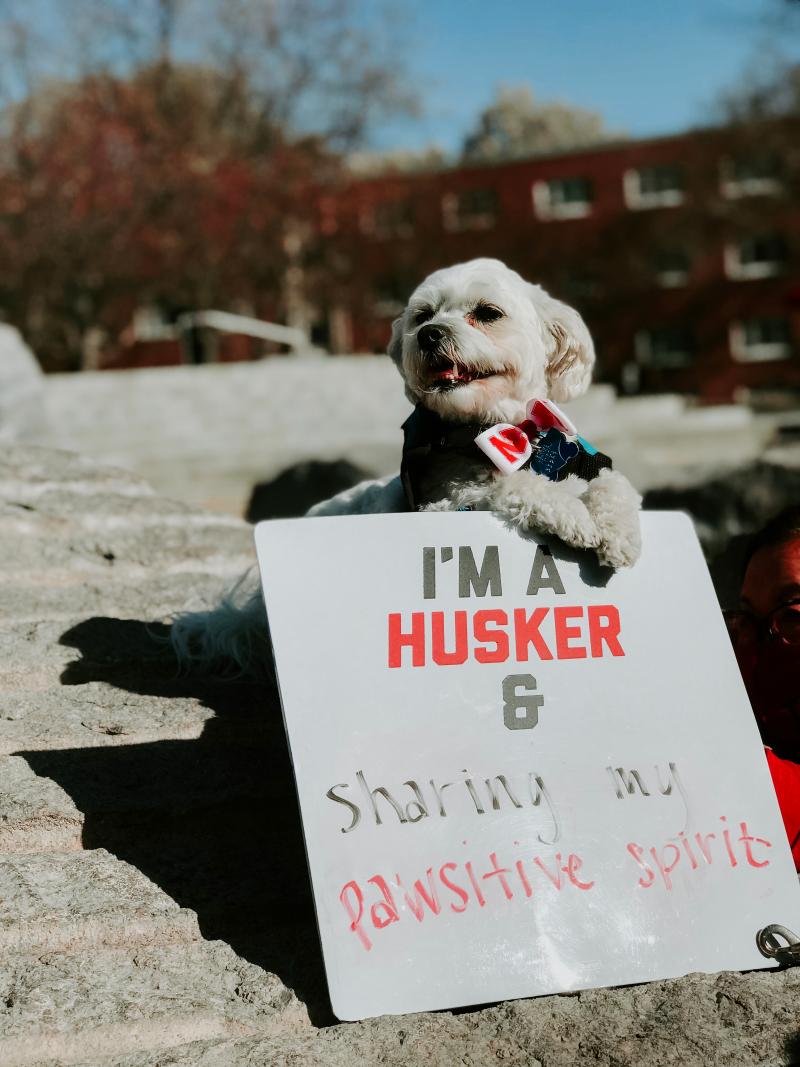
Neo is a dog with a job. As a licensed therapy animal, Neo helps the students at Student Support Services (SSS) as they navigate college. Twice a week he joins owner Dr. Joyce Lehn as she makes her way to the office. When Joyce begins to tackle her tasks as assistant director at SSS, Neo usually begins his rounds — he'll say his hellos to coworkers and students, and then return to Joyce's office to snuggle up in his designated dog couch. When students are in need of stress relief, Neo is more than happy to help. He sits on their lap and keeps them company, distracts them with games of fetch and provides a sense of comfort and relief with his happy-go-lucky attitude and always-wagging tail. Though Neo hasn't always been a therapy dog, he's always been attuned to people. His first unofficial therapy dog task was as a cheer-giver to Joyce's mother as she went through hospice. Nurses were impressed at how well he was able to recognize Joyce's mother's comfort needs and provide affection — and so was Joyce. Shortly after noticing this talent in Neo, Joyce enrolled him in a training program so he could become officially certified. After months of classes and an internship at a local school, Neo graduated from his therapy dog training. With his certification in paw, Neo helps the students, staff and faculty of the University of Nebraska–Lincoln find a positive outlook on their day.
“When students are in need of stress relief, Neo is more than happy to help. He sits on their lap and keeps them company, distracts them with games of fetch and provides a sense of comfort and relief with his happy-go-lucky attitude and always-wagging tail.”
Karen
UPC Nebraska Program Coordinator · Omaha, Nebraska
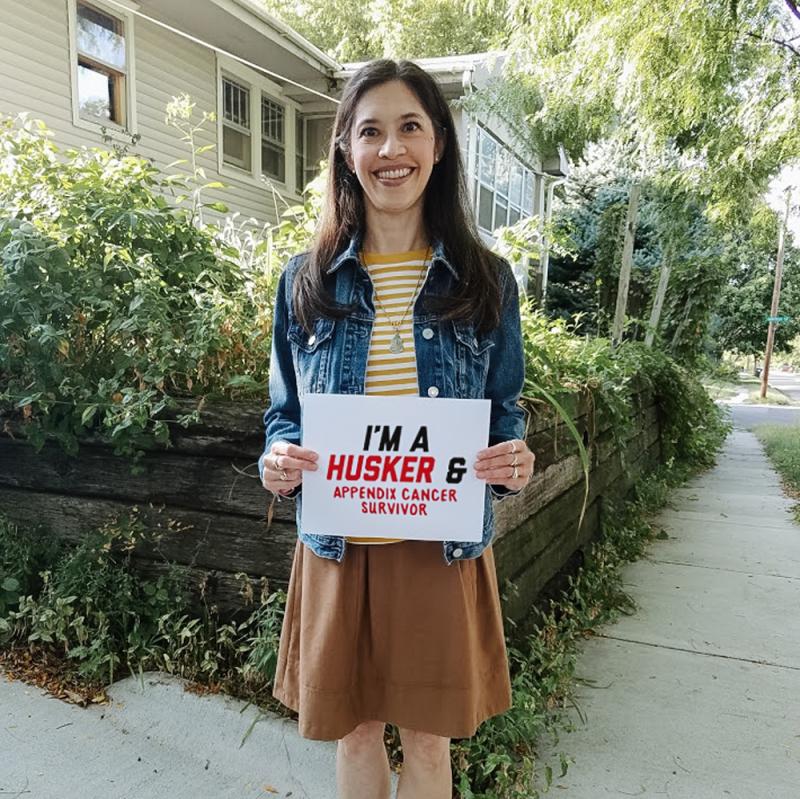
Resilience is something Karen knows well. After a summer of CT scans, blood work, ultrasounds and a diagnostic laparoscopy, she was diagnosed with appendix cancer in 2017. "My husband, Matt, and I both cried and our son, Talley, who was 15 years old at the time, was very calm and encouraging. It was when our daughter, Liem, who was only 12 years old at the time, bawled her eyes out and yelled, “No, Mom I need you!” did I know that I had to do whatever was necessary to survive.” Almost three years ago to the day, she sat down with a doctor at Nebraska Medicine to start her journey to recovery, one she says was driven by her desire to live for both her family and her UPC Nebraska students. It is these students who have taught her the importance of dedication, passion, commitment, adaptability and perseverance. And it is something she’s seen from them in the last several months especially. "The best part is seeing the excitement and pride my members have after months of planning an event and then watching it successfully take place...As our mission statement says, we provide diverse, educational, and entertaining programs to enhance the Nebraska community. We will do what it takes whether we are in-person or remote to provide those opportunities because students learn the most from their out of classroom experiences." Karen has worked as the UPC Nebraska advisor for 21 years and she’s enjoyed watching the members grow, learn and develop personally and professionally year after year. And though this year is different than others, she learned something important while recovering from appendix cancer: the value of being able to connect virtually, both in her personal life and through virtual UPC Nebraska events. True to her advocacy for positivity, health and safety, she leaves Huskers with one final note to keep our campus community safe: “If my doctor can wear a mask during my 14-hour [surgery], I think we can all wear masks while on the UNL campus.”
“True to her advocacy for positivity, health and safety, she leaves Huskers with one final note to keep our campus community safe: “If my doctor can wear a mask during my 14-hour [surgery], I think we can all wear masks while on the UNL campus.””
Pankaj
Residence Director at Knoll Residential Center · LIncoln, Nebraska
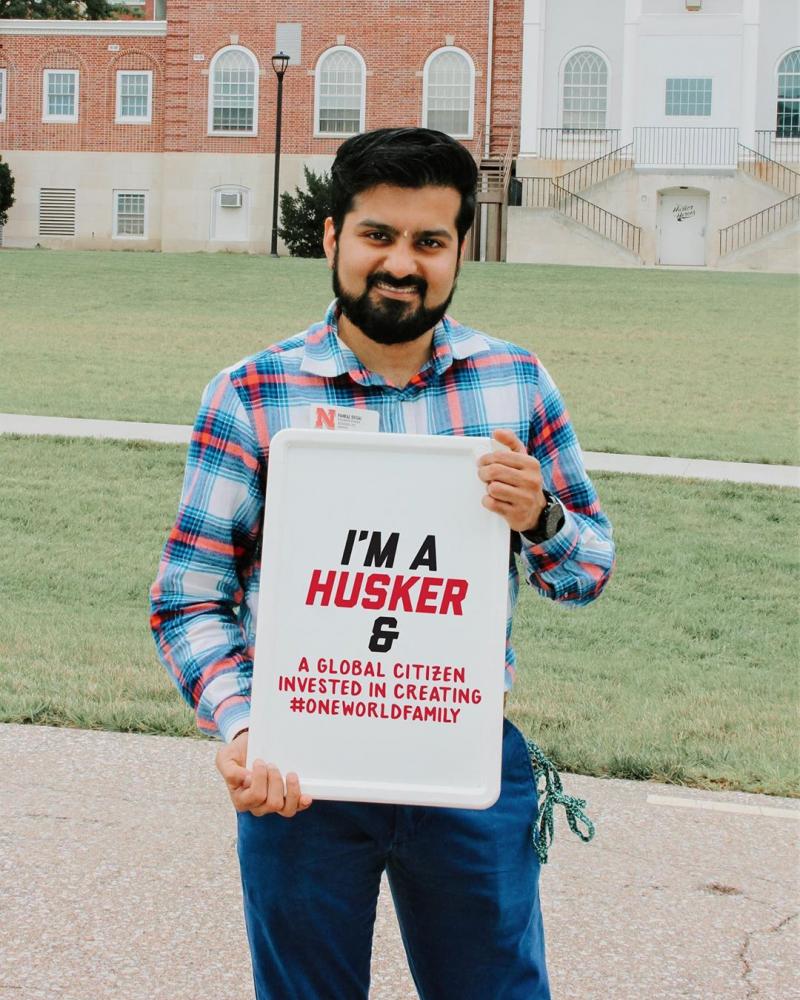
Pankaj has always wanted to contribute to communities through educational upliftment. Originally from India, he received his master's degree in North Carolina and is now a doctoral candidate and a Residence Director at Nebraska. "When I started six years ago, Nebraska seemed like a place where I could not only learn so much but also begin to contribute through my work as a Residence Director with Residence Life…I have come to appreciate Nebraska for the numerous people who really care for our students and are active advocates for their growth and well-being." Pankaj spent the summer helping prepare for the arrival of students with the rest of the Residence Life team, brainstorming ways residence halls could continue to be places students learn, engage with others and invest in the communities they become a part of. Intentional interaction, virtual programming and additional educational content will help students grow personally and academically, form connections and learn ways to engage in conversations with others. His work to empower students’ growth and support their sense of belonging is even more important now. He and the Residence Life team are engaging in ongoing education with residents on best practices and how to protect themselves and their community from getting sick. And he wants students to know that we are all in this together; that we each must work to create and maintain a safe learning and living environment. Pankaj leaves students with a reminder: "Physical distancing does not have to mean social isolation. Ensure that you continue to invest in your well-being as well as look out for the safety of those around you even as you make the most of opportunities to form residential communities."
“Physical distancing does not have to mean social isolation. Ensure that you continue to invest in your well-being as well as look out for the safety of those around you even as you make the most of opportunities to form residential communities.”
Jim
associate vice chancellor for University Operations · LIncoln, Nebraska
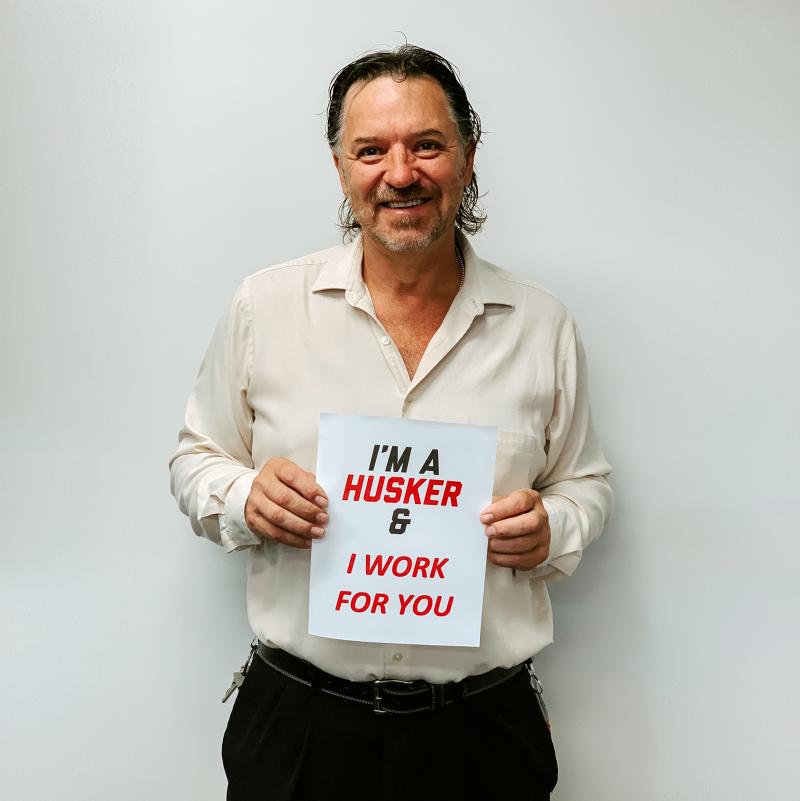
When Huskers return to the University of Nebraska–Lincoln, campus will be sanitized and safer thanks to the efforts of University Operations and many campus partners. These campus units collaborated on the creation of more than a thousand hand sanitizer stations that will be placed across the university's campuses. These stations were built from scratch by the university — including special 3D printed parts and sanitizer produced on Nebraska Innovation Campus. Jim Jackson is associate vice chancellor for University Operations and was one of the members of the team that spearheaded the hand sanitizer station efforts. As a leader he's always made an effort to be proactive in planning the operations of the university, but with COVID-19 he found that his job quickly transitioned to reacting to the current situation facing campus. And with the current situation calling for increased sanitation and cleanliness to allow Huskers to safely engage in campus life, his team went into overdrive to brainstorm, develop and deploy the stations. For Jim, the creation of the hand sanitizer stations is yet another example of the hard work and resilience that is woven into the university community. He refers to the return to campus as a "carrot" — the incentive that pushes his team to innovate and adapt so they can meet their end goal. "You got to still keep your eye on the future and what's the 'carrot'..." Jim said, "And it is to return back to educate our students and keep this campus open and doing what we do safely."
“You got to still keep your eye on the future and what's the 'carrot'...and it is to return back to educate our students and keep this campus open and doing what we do safely.”
Kevin
Program Coordinator at the Jackie Gaughan Multicultural Center · LIncoln, Nebraska
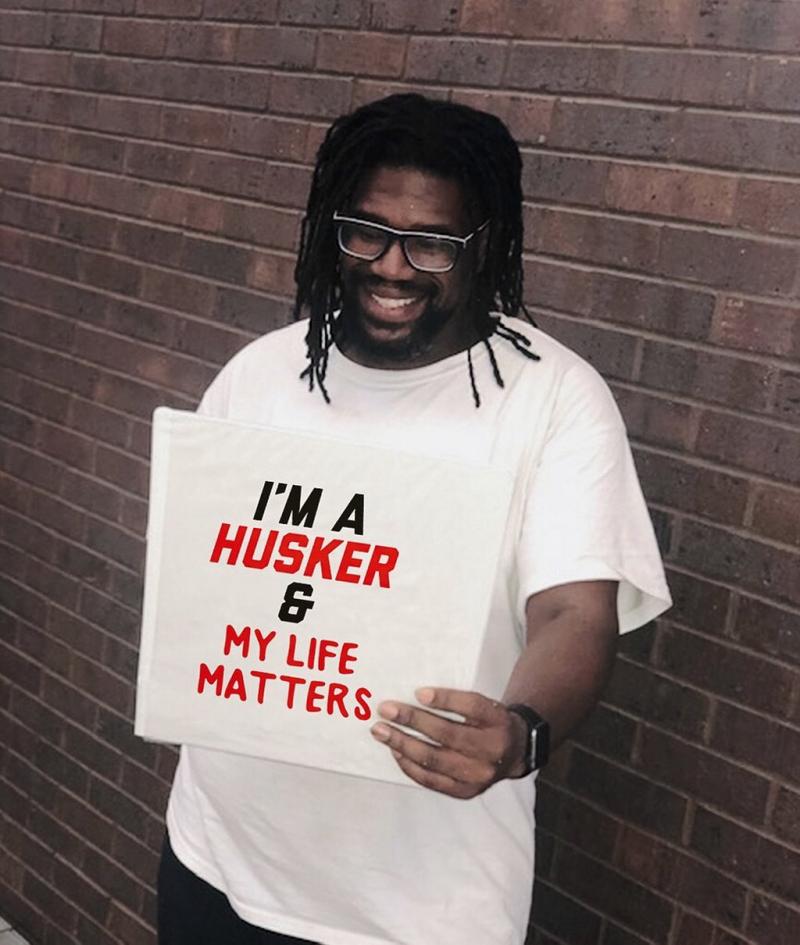
When Kevin was growing up, his grandmother always told him that “life begins at the end of your comfort zone.” Kevin has taken that message to heart. It’s what drove him to work at University of Nebraska–Lincoln’s Office of Academic Success and Intercultural Services (OASIS), and he echoes its meaning each week at Dish It Up. Dish It Up is a space for the UNL community to gather and engage in meaningful dialogue. This summer, Kevin hosted special editions of Dish It Up for those who want to engage in conversations surrounding the injustices that have been inflicted on the Black community both historically and in recent weeks. While typical Dish It Up meetings have 25 to 40 attendees, more than 500 people registered for the first round of the special edition topic sessions. They’re conversations that force people out of their comfort zone and allow them to hear different perspectives and stories. “The conversations are important because in order to learn and grow from one another and from each other, we have to be able to listen,” Kevin said. Kevin said that the best way to be an ally is by asking questions. Programs like Dish It Up allow you to ask those questions, but you can also dig into them through podcasts, books and other educational resources. He encourages people to use their platforms and their abilities as best they can — from posting on social media, to donating funds, to volunteering with organizations that empower marginalized people. “Whether you realize it or not, we’re all in this thing together.” Kevin said, “We are all interwoven into the fabric of UNL....We’re all different colors and shapes and sizes and religious beliefs and political beliefs and, you know, hair colors and eye colors....So we’re all woven into this thing together, and so it is your responsibility to help somebody else.”
“"Whether you realize it or not, we’re all in this thing together. We are all interwoven into the fabric of UNL."”
Roger
campus tour guide coordinator · LIncoln, Nebraska
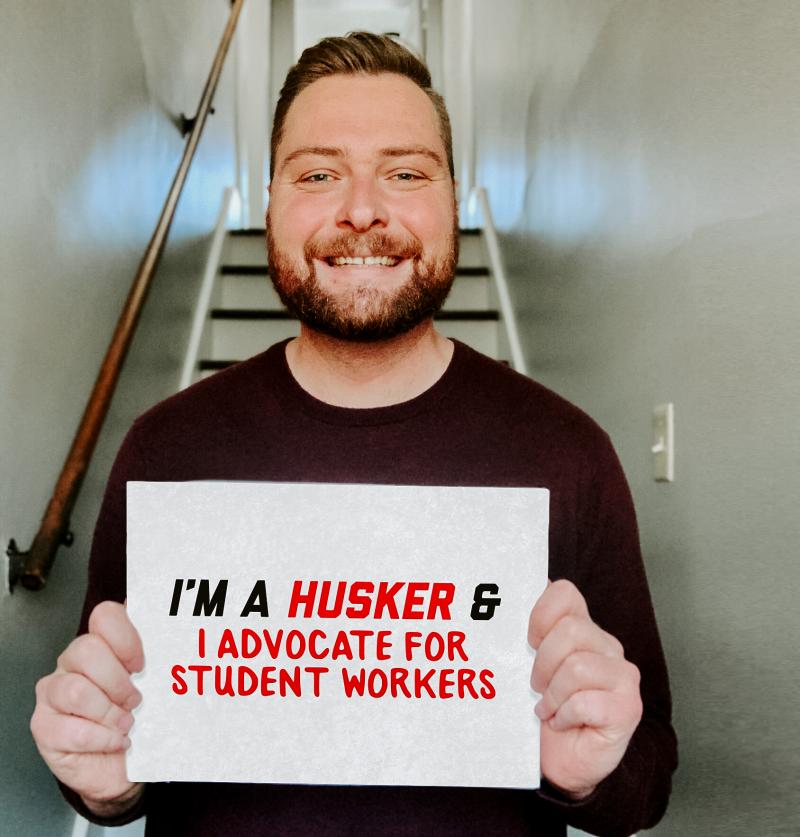
Throughout the academic year, friendly faces greet prospective students and their families to show them what life at Nebraska is all about. They are our campus hosts. With close to 70 students working in this role, they are able to provide personalized campus tours to guests while sharing their stories on why the University of Nebraska–Lincoln is special to them. But when COVID-19 social distancing measurements were put into effect, all tours were cancelled, and these students were left without work. Campus tour guide coordinator Roger Allen works with all the campus hosts. They're his students, and he focuses on developing them as leaders and getting to know them as people. Knowing that they would be without work during this time affected him, and he quickly stepped into action. Roger created a six-week course that all campus hosts could take for pay. Each week they would discuss their UNL experiences, watch videos from speakers across campus and continue to better their recruitment skills. For the 45 students that took Roger's course, it was a way to continue working while also keeping some normalcy in their lives while they were adjusting to remote learning, cancelled internships and cancelled study abroad trips. But most notedly, the class provided them an opportunity to continue learning and developing even as life went remote. "Just working with them is like the best part of my job."
“Knowing that they would be without work during this time affected him, and he quickly stepped into action.”
Crystal
Custodial Staff · UNL
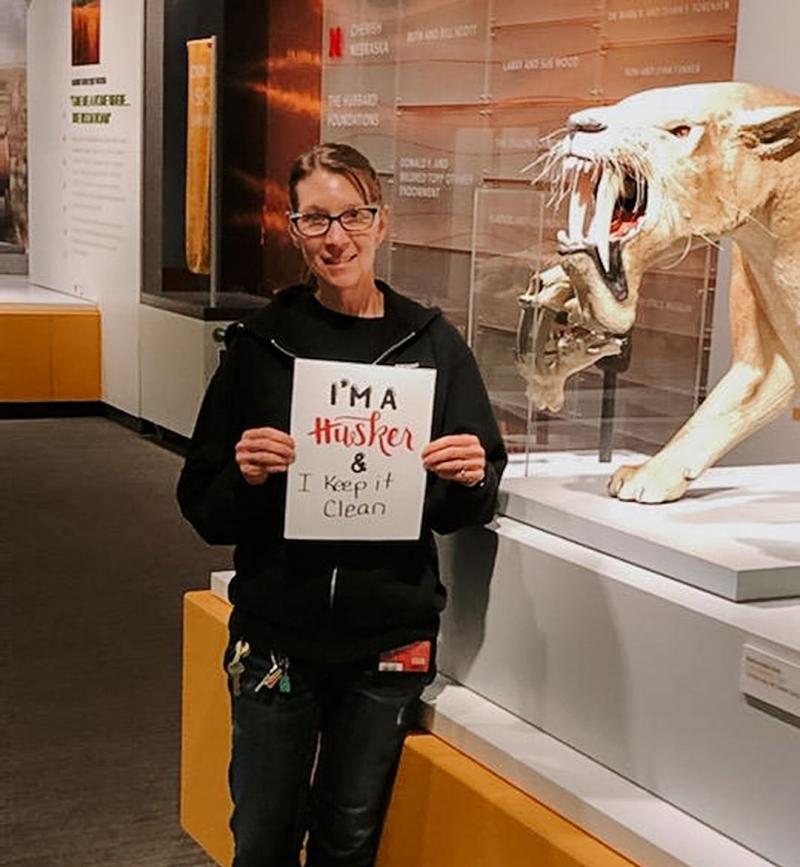
As members of the UNL custodial staff, Bill and Crystal's main focus is to clean and maintain the university's facilities. But while that may be their main mission, one of their favorite aspects of the job is interacting with the students, faculty, and staff that they serve.
Bill is responsible for a section of Hardin Hall and Crystal is stationed in Morrill Hall. After working in the halls for some time, the two have made connections with those they see during their shifts.
From friendships formed with professors they see every time they take a coffee break, to conversations shared with students about their families and studies, the pair have grown close people that frequent their buildings. "I've made some wonderful, wonderful relationships," Bill said. "And I do miss that right now because nobody's here." Now that access to campus is limited, Crystal and Bill still report for work at the same hours each day, but some of their old tasks are missing. With only employees that provide necessary support services entering campus, everyday practices like cleaning offices and wiping toddler-sized handprints off of the exhibit glass at Morrill Hall are no longer necessary.
But the most notable thing that's missing is the students, faculty, and staff that have become their friends. "When we're busy when we interact with people...that's our normal," Crystal said, "This is not normal." Bill and Crystal often interact more with the communities in their halls than they do with their own coworkers in the custodial services department. While this time might be lonely, strange, and even make them nostalgic for their old normal, they know that it won't always be this way. "I really have faith that we're going to get through this," Crystal said, "And we'll be back to seeing those little kiddos and the big kiddos coming into our building."
“While this time might be lonely, strange, and even make them nostalgic for their old normal, they know that it won't always be this way.”
Bill
Custodial Staff · UNL
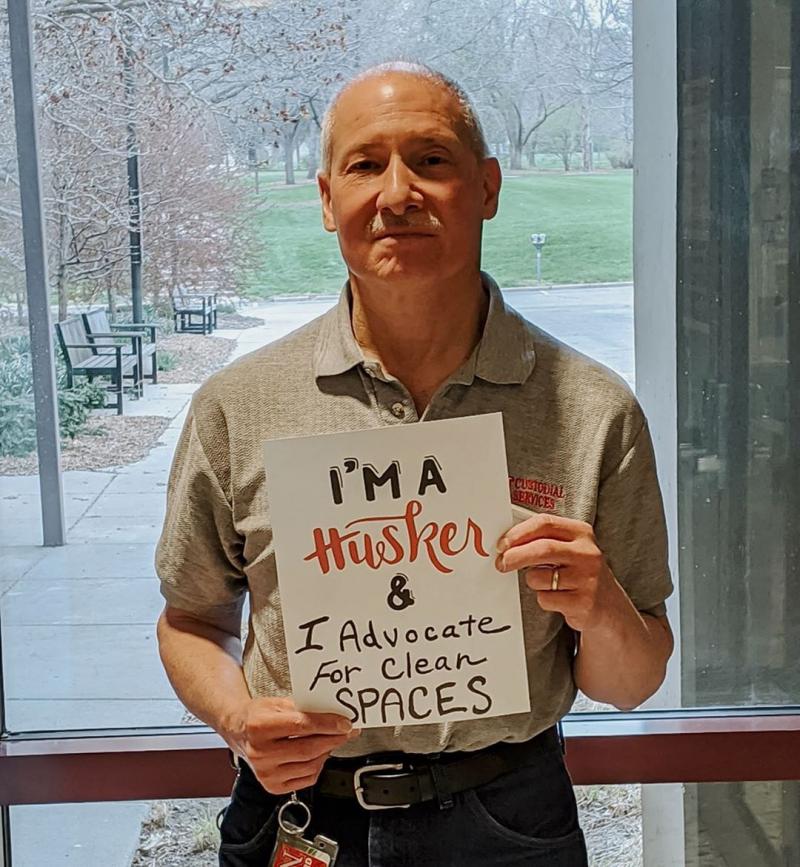
As members of the UNL custodial staff, Bill and Crystal's main focus is to clean and maintain the university's facilities. But while that may be their main mission, one of their favorite aspects of the job is interacting with the students, faculty and staff that they serve. Bill is responsible for a section of Hardin Hall and Crystal is stationed in Morrill Hall. After working in the halls for some time, the two have made connections with those they see during their shifts. From friendships formed with professors they see every time they take a coffee break, to conversations shared with students about their families and studies, the pair have grown close people that frequent their buildings. "I've made some wonderful, wonderful relationships," Bill said. "And I do miss that right now because nobody's here." Now that access to campus is limited, Crystal and Bill still report for work at the same hours each day, but some of their old tasks are missing. With only employees that provide necessary support services entering campus, everyday practices like cleaning offices and wiping toddler-sized handprints off of the exhibit glass at Morrill Hall are no longer necessary. But the most notable thing that's missing is the students, faculty and staff that have become their friends. "When we're busy, when we interact with people...that's our normal," Crystal said, "This is not normal." Bill and Crystal often interact more with the communities in their halls than they do with their own coworkers in the custodial services department. While this time might be lonely, strange, and even make them nostalgic for their old normal, they know that it won't always be this way. "I really have faith that we're going to get through this," Crystal said, "And we'll be back to seeing those little kiddos and the big kiddos coming into our building."
“Bill and Crystal's main focus is to clean and maintain the university's facilities. But while that may be their main mission, one of their favorite aspects of the job is interacting with the students, faculty, and staff that they serve.”
Kylie
Counseling and Psychological Services · Suzhou, China
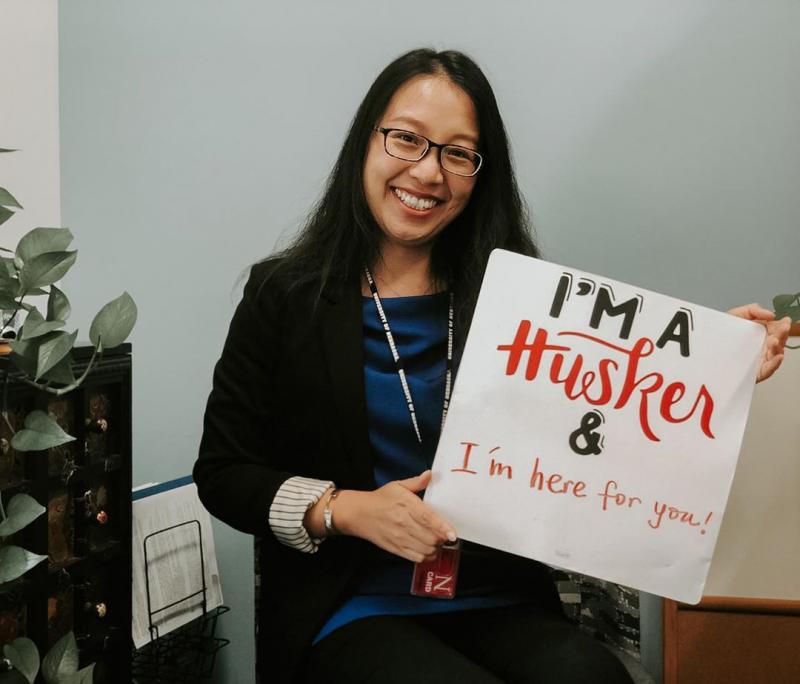
Kylie works day in and day out to help international students feel at home in Nebraska. When international students arrive in Nebraska, they face more than just a language difference. They also encounter differences in culture, values, weather, and food — all while juggling their classes. This can cause stress in many students. As a counselor for Counseling and Psychological Services (CAPS), Kylie is there to help. Kylie feels especially passionate about helping students adjust to living and studying in a new country after her own experience with acclimating to U.S. culture. She runs the International Student Discussion support group as well as Stress Management Consultation for International Students. Both opportunities are designed with the intention of making it easy for students to drop in and connect with a counselor without having to register or check-in at a front desk. She says that while international students are her focus, they're not the only students facing stressful situations in college. "Everyone has all different levels of stress," Kylie said. "You are not the only one. If you feel you're overwhelmed by stress, seek out help." By participating in a group or private counseling session through CAPS, students can learn about coping skills and stress management tactics. It also provides them with the opportunity to meet face-to-face with a care provider. "To know that we are not alone, we know that logically," Kylie said. "But to feel that you are not alone, that's the connection that works to help support you to get through things."
“ Kylie feels especially passionate about helping students adjust to living and studying in a new country after her own experience with acclimating to U.S. culture.”
Rachel
Yoga Instructor · Hickman, Nebraska
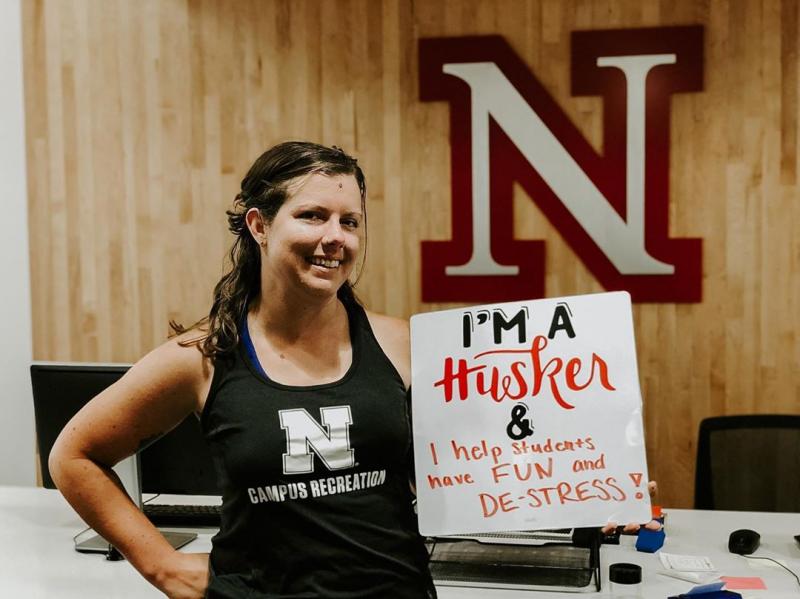
Before the picnic blankets are laid out and the music starts at Jazz in June, you can find members of the University of Nebraska–Lincoln community doing yoga among the greenery by Woods Art Building. Run by Rachel Huenink, a group fitness instructor with UNL Campus Rec, the classes provide an opportunity for students to drop in and participate in a yoga class that's surrounded by the sun and nature. "It's a really great way to have fun, it's a good way to meet people," Rachel said, "And to help people just feel good in their bodies." Before transitioning to teaching yoga, Rachel worked as an addiction therapist. She holds a masters in counseling psychology and said that she thinks many of the mental health practices she learned in graduate school come from yoga traditions. In fact, she said that many of the people in her 500-hour training program are mental health professionals. "There's certainly a lot of overlap," Rachel said. For Rachel, teaching yoga is a way to help students de-stress and unwind from the pressures of college. She likes to keep her classes lighthearted, often calling it "smiling yoga" since that's what she wants her participants to be focusing on. "Life is pretty serious. School is very hard," Rachel said, "Yoga class shouldn't be something that stresses you out."
“She holds a masters in counseling psychology and said that she thinks many of the mental health practices she learned in graduate school come from yoga traditions.”
Charlie
Director of OASIS · Tuscaloosa, Alabama
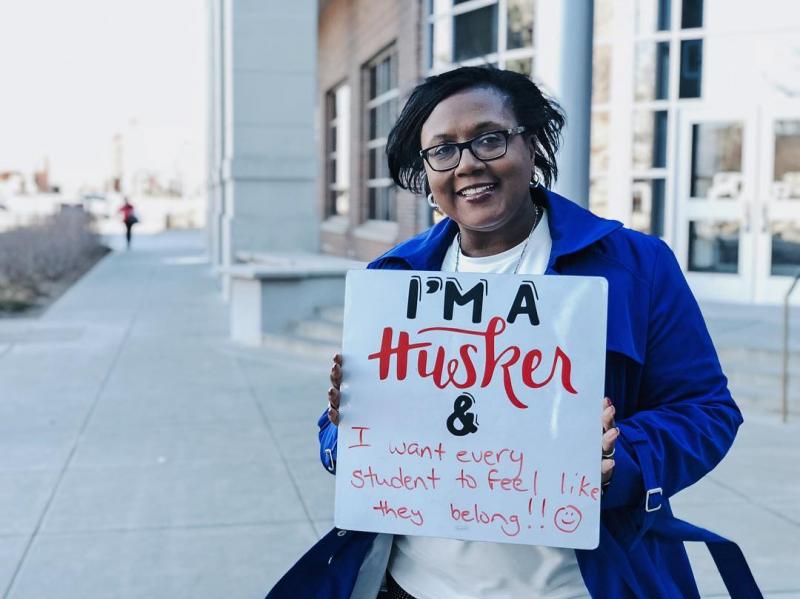
From the moment she wakes up in the morning until she goes to sleep, Charlie Foster is focusing on diversity and inclusion at the University of Nebraska-Lincoln. For 15 years, Charlie worked as a counselor for Nebraska's Counseling and Psychological Services (CAPS) where she focused on helping underrepresented students on-campus. Charlie now holds the position of Director of the Office of Academic Success and Intercultural Services and the Jackie Gaughan Multicultural Center. Her role focuses on serving others and giving every member on campus a voice, something she's had a passion for since elementary school. Whether it be helping others with their mental health journeys or providing students with resources to get them through school, Charlie said she wants to be the person she needed when she was younger. In her family, Charlie was a first-generation college student. Throughout her college experience, she said she needed a role model to tell her she could make it and was worthy of the life she wanted for herself. Often times, students who are looking for help just need someone to advocate for them. To further inspire students at Nebraska, she tells them to "go be amazing," something she believes every students needs to hear throughout this chapter. Her mission on campus is to see students succeed, even if they've doubted themselves in the past.
“Whether it be helping others with their mental health journeys or providing students with resources to get them through school, Charlie said she wants to be the person she needed when she was younger.”
Joe
Air Force Veteran · Lincoln, Nebraska
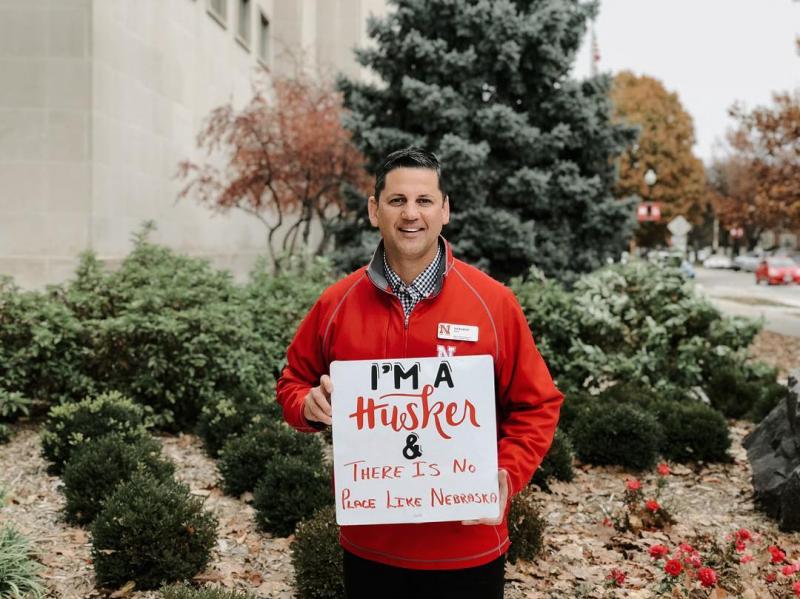
Joe Brownell, director of Nebraska’s Military and Veteran Success Center, said he operates the center with one goal in mind: helping students achieve their academic and career goals. “Some [students] take a straight path, and others may have to explore a little bit more, but through it all you’re creating connections so that individuals are successful not only here, but in society,” he said. The Military and Veteran Success Center, now in its fourth year, provides support to students in regard to their military service and academics, offering academic tutors, peer mentors and even medical tests and screenings. For Brownell, the military wasn’t just about serving but doing your part. That’s why he got involved with the center shortly after he retired from the Air Force in August 2018, “I’ve always believed in servant leadership, and this is helping to do that,” Brownell said. “Your career doesn’t end when you leave the military, you still have to give back." As director of the program, Brownell said his main job is to ensure that students have the services and the support that they need to be successful. While it hasn’t always been an easy journey, which Brownell attributes to there not being enough time in the day, he still takes pride in seeing students succeed and accomplishing their goals. “At the end of the day, whatever decisions we make, if we’re focused on the students we’ll be successful,” Brownell said.
“For Brownell, the military wasn’t just about serving but doing your part.”
Carolyn
Curator of Collections · Omaha, Nebraska
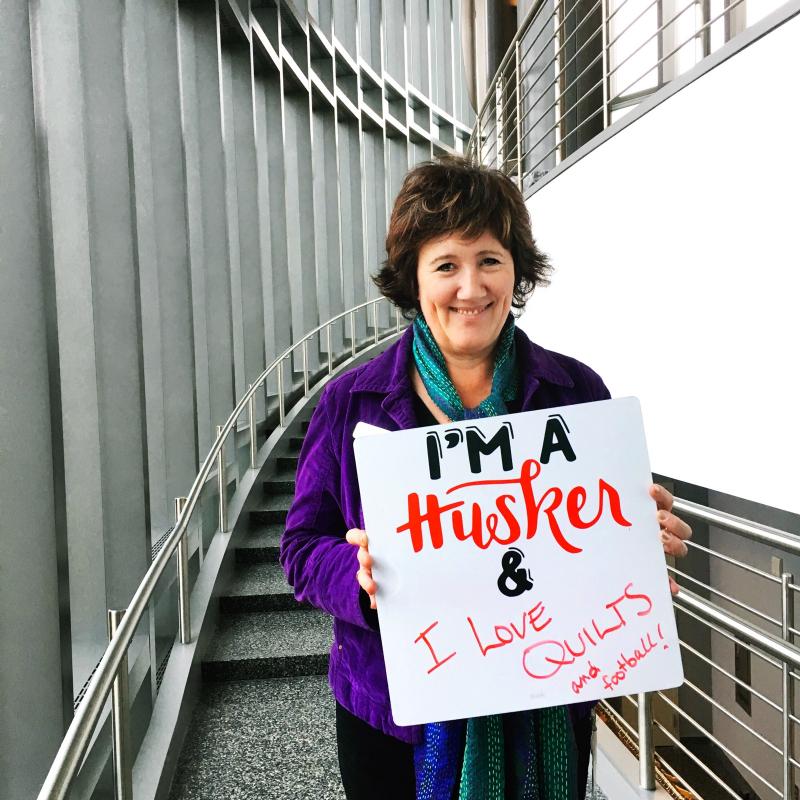
Carolyn has traveled around the world gathering the textiles we often take for granted: quilts. She's been able to visit top artists in their studios across the globe, which allows her to better understand broader influences and see how much passion artists have for their work. She's currently celebrating her 20th year as the curator of collections at the International Quilt Study Center & Museum, a state-of-the-art building that boasts over 4,000 quilts on Nebraska's East Campus. The Quilt Center collects thinly across a very broad range of quilts. Pieces range from unconventional materials, such as paper or electricity, to traditional patchwork. Carolyn loves the intimacy of quilts, because you can learn personal, social, cultural and technical issues. She believes quilters are just as much artists as painters or sculptors, and she's ready to put that debate behind us. Quilters are consciously involved in a creative act and making decisions with color and line. Although quilts may be stereotyped as something grandmothers make, there's a young, active quilting guild in the Lincoln and Omaha area. Carolyn's excited to see a younger audience bring in new perspectives, styles and colors to the art. The museum is free for students and their families, and if you're not in the mood to browse the exhibits, there's free WiFi and seating areas for studying.
“Carolyn loves the intimacy of quilts, because you can learn personal, social, cultural and technical issues.”
Jan
Director of the Women's Center · Lincoln
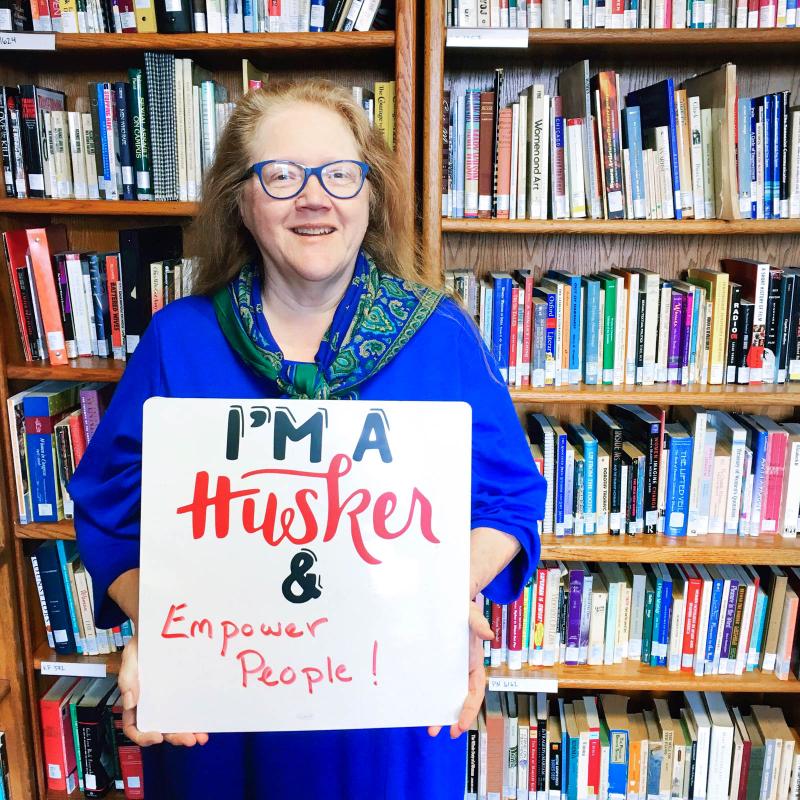
Jan has been the director of the Women's Center since 1998, but that's not where her NEBRASKA story began. She started her undergrad at Nebraska, but at the end of her freshman year, her mother suddenly passed away. When she came back the next fall, no one asked if she was okay. She kept it together for two more years, but eventually flunked her classes and dropped out. After three years, she came back to school and discovered the Women's Center. She felt completely welcomed, and the people there gave her resources and connections to cope with her loss. That experience has shaped how she directs the center today. Now, there are a lot more men interested in violence prevention work, and Jan has even created a men and masculinity class that's being offered this spring. More services have been created, too, like free confidential counseling, 6,000 gender-related books and outreach programs. These programs include UNL Prevent, a relationship violence peer education group that focuses on bystander intervention and sexual assault awareness, and Healthy Outlook Peer Educators, a group that focuses on body image and self esteem. When reflecting on her time so far, Jan is most proud of the alumni that took the center's philosophy of empowerment and collaboration to make real change in the world. One has gone on to be the director of the Women's Fund in Omaha, another works in Denver at a eating disorder recovery center and many more are making a positive impact in our community.
“When reflecting on her time so far, Jan is most proud of the alumni that took the center's philosophy of empowerment and collaboration to make real change in the world.”
